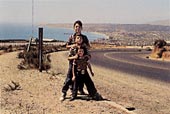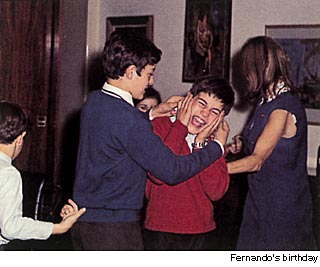|
 Marcelo
shows me a picture he took of his brother when his brother was twelve.
Marcelo's brother’s name is Fernando. It is a strange picture. Fernando
is sitting on the floor and looks at the camera with his head tilted slightly
to the left . But he has no face. A strong and unexpected light masked
its features. Fernando will disappear at age 22. He will be just one of
many victims in a country devastated by the obscenity of death without
bodies, without earth, without rest. This picture of him foretells the
destiny that the executioners wanted to give his face, erasure from reality,
from existence, and from memory. So I suppose that,deep down, what Marcelo
wants to do with this book is give his brother back the face he had; to
stubbornly and lovingly trace those features, with militant obstinacy,
to win back –in each subtle shade that love and love's will can restore
to that face– his place in memory, a place from oblivion,to recover
the space of that face from death and oblivion. Marcelo
shows me a picture he took of his brother when his brother was twelve.
Marcelo's brother’s name is Fernando. It is a strange picture. Fernando
is sitting on the floor and looks at the camera with his head tilted slightly
to the left . But he has no face. A strong and unexpected light masked
its features. Fernando will disappear at age 22. He will be just one of
many victims in a country devastated by the obscenity of death without
bodies, without earth, without rest. This picture of him foretells the
destiny that the executioners wanted to give his face, erasure from reality,
from existence, and from memory. So I suppose that,deep down, what Marcelo
wants to do with this book is give his brother back the face he had; to
stubbornly and lovingly trace those features, with militant obstinacy,
to win back –in each subtle shade that love and love's will can restore
to that face– his place in memory, a place from oblivion,to recover
the space of that face from death and oblivion.
When suffering is
excessive we run the risk of abstraction. They tell us ten thousand, fifteen
thousand, thirty thousand, and the figures shock us. But it is horror
of the figure, not of the people. This is why the mothers of the missing,
of the disappeared, tirelessly lift signs showing those faces. "Look at
them," they say. "This is what they were like. They were not numbers.
They were these faces that you see.  And
each of these faces belonged to a person who wanted to live, and love,
and struggle." The restitution of the face will come only through the
obstinacy of memory. Because of this, this is a photographer's book. It
is the book of a man who has chosen the profession of seeing, the job
of gazing. And
each of these faces belonged to a person who wanted to live, and love,
and struggle." The restitution of the face will come only through the
obstinacy of memory. Because of this, this is a photographer's book. It
is the book of a man who has chosen the profession of seeing, the job
of gazing.
It is also, and by
no means to a lesser degree, the book of a poet. Here the search is carried
out by means of words. Searching is always expressive. And the first poem
in a book by Marcelo called Parábola says, in an uncompromising
settlement of accounts with his merciless country, something this desolate:
"Dead, dead/ you also gave me that Argentina/ and it is not that I do
not love you/ but friends, those friends who are few/ and brothers, who
are not reborn/ with what? with what?/ with nothing." Marcelo comes
over to my house, bringing me pictures and old home movies. Fernando is
there, in the movie, at a picnic. It is a typical Buenos Aires family
weekend. Someone, who my wife and I know, and who has now -Marcelo tells
me- slipped into the shadows of madness passes by, carrying some meat
towards the grill.  Marcelo
is also at this picnic. And it will be years before he has the grey he
now has in his hair, and he is far from even suspecting the pain the future
holds in store for him. And Femando appears again. And he walks easily,
and smiles, unworried. And Marcelo says: "He was seventeen then." And
he adds:"He was in one of the last years of his life. And he says it naturally.
Or rather, he has learned to say it naturally because he has had to say
it so often, because he had had to say, so often, that his brother lived,
at seventeen, one of the last years of his life, because they killed him
at twenty two. But right at that moment -right at the moment that Marcelo
says "he was in the last years of his life"- I, who am next to him looking
at the living image of Fernando at this family picnic, feel the scandal,
the infamous mutilation of the crime that was committed. Language habitually
leads us to say that a murder victim "Ioses his Iife". It is also said
that "they took his life". I swear I have never felt the true intensity
of these expressions like at that instant. They took Fernando’s life,
they forced him to lose it. It is unjust, intolerable that someone should
be condemned to live one of the last years of his life at seventeen.
It is unjust, intolerable for a gang of executioners to take a
kid’s future from him, his whole life, his chance of happiness,
of sadness, of making mistakes, of regretting them, of
reflecting, of maturity, of playing, of madness, of feeling
passion, and of being old, and of decadence, and even of death,
but one’s own death, the death one earns and molds and stews throughout
one’s life, the death that one, at the end, confronts resignedly,
or with fear, or angrily, or however. But it is one’s own death,
not the atrocious death of executioners. Marcelo
is also at this picnic. And it will be years before he has the grey he
now has in his hair, and he is far from even suspecting the pain the future
holds in store for him. And Femando appears again. And he walks easily,
and smiles, unworried. And Marcelo says: "He was seventeen then." And
he adds:"He was in one of the last years of his life. And he says it naturally.
Or rather, he has learned to say it naturally because he has had to say
it so often, because he had had to say, so often, that his brother lived,
at seventeen, one of the last years of his life, because they killed him
at twenty two. But right at that moment -right at the moment that Marcelo
says "he was in the last years of his life"- I, who am next to him looking
at the living image of Fernando at this family picnic, feel the scandal,
the infamous mutilation of the crime that was committed. Language habitually
leads us to say that a murder victim "Ioses his Iife". It is also said
that "they took his life". I swear I have never felt the true intensity
of these expressions like at that instant. They took Fernando’s life,
they forced him to lose it. It is unjust, intolerable that someone should
be condemned to live one of the last years of his life at seventeen.
It is unjust, intolerable for a gang of executioners to take a
kid’s future from him, his whole life, his chance of happiness,
of sadness, of making mistakes, of regretting them, of
reflecting, of maturity, of playing, of madness, of feeling
passion, and of being old, and of decadence, and even of death,
but one’s own death, the death one earns and molds and stews throughout
one’s life, the death that one, at the end, confronts resignedly,
or with fear, or angrily, or however. But it is one’s own death,
not the atrocious death of executioners. Another photo
from this book is the one of Marcelo and Fernando standing somewhere
where there is a sign saying "It Is Foribdden to Stay Here". I believe
it symbolizes a generation that stood up to the establishment, that confronted
everything with the intellectual and ethical courage to question it profoundly.
"We are here," Fernando and Marcelo say, "precisely because of that, because
it is forbidden." They also say: "Because we want to be the ones to set
our own limits." This is what the faces of the many other young men and
women in this book look like, the young men and women of the Colegio Nacional
Buenos Aires: aimed at the future, displacing limits, broadening reality
to make it fit the dimensions of their desires.
Another photo
from this book is the one of Marcelo and Fernando standing somewhere
where there is a sign saying "It Is Foribdden to Stay Here". I believe
it symbolizes a generation that stood up to the establishment, that confronted
everything with the intellectual and ethical courage to question it profoundly.
"We are here," Fernando and Marcelo say, "precisely because of that, because
it is forbidden." They also say: "Because we want to be the ones to set
our own limits." This is what the faces of the many other young men and
women in this book look like, the young men and women of the Colegio Nacional
Buenos Aires: aimed at the future, displacing limits, broadening reality
to make it fit the dimensions of their desires.
And I return to Marcelo´s
poem. He speaks of Argentina, of the dead, of the many dead Argentina
gave him. And he confesses that it is not that he does not love Argentina,
because, it is true, we all love this country. But brothers are only born
once. And then, despairing, he says: with what? with what?, with nothing.
Not with nothing Marcelo. For now, it is with this book.
|